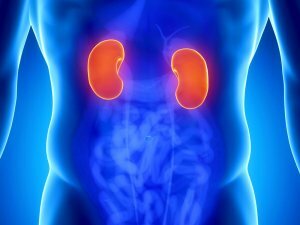Inflammation of the adrenal glands

Description
Adrenal glands are paired glands located on the upper poles of the kidneys.
They perform the following functions:
- produce hormones;
- produce adrenaline and noradrenaline;
- are involved in metabolic processes;
- stimulate stress reactions.
How does hormone cortex work in the glomerular zone of the adrenal glands?
- Aldosterone. Takes part in water-salt metabolism, increasing blood circulation and increasing blood pressure.
- Deoxycorticosterone. Strengthens the muscles of the skeleton, increases the resistance of the body.
- Corticosterone. Regulates the water-salt balance.
 Adrenal hormones play a major role in the body's work, and their deficiency or overabundance leads to disruption of the work of all organs.
Adrenal hormones play a major role in the body's work, and their deficiency or overabundance leads to disruption of the work of all organs.
Causes of
The most common cause of inflammation is the failure of the adrenal cortex, which develops against the background:
- of tubercular inflammation of the organ;
- of the adrenal gland;
- hemorrhages in the adrenal glands with injuries;
- circulatory disorders in the tissues of the kidneys;
- syphilitic organ damage;
- purulent process in the adrenal gland,
- amyloidosis( a violation of protein metabolism);
- autoimmune lesion;
- genetic atrophy of the gland cortex.
Symptoms of
 The development of inflammation of the adrenal cortex occurs very slowly. It is accompanied by the appearance of weakness, weight loss, rapid fatigue. There is a pigmentation of the skin in places that are exposed to friction or ultraviolet rays.
The development of inflammation of the adrenal cortex occurs very slowly. It is accompanied by the appearance of weakness, weight loss, rapid fatigue. There is a pigmentation of the skin in places that are exposed to friction or ultraviolet rays.
For a sick person is characterized by:
- low blood pressure;
- decreased appetite;
- occurrence of nausea, vomiting and diarrhea.
The occurrence of mental disorders:
- irritability;
- alarm;Inability to prevent stress;
- of insomnia;
- hand trembling;
- craving for sweet and salty;
- sense of panic.
The main visible signs of the disease are:
- Low blood pressure.
- Reduced appetite.
- Weight loss.
- Skin pigmentation.
- General weakness.
If these symptoms are detected, then there is a disease and should immediately begin treatment.
Diagnosis
 At the initial examination the doctor performs palpation.
At the initial examination the doctor performs palpation.
Confirm the diagnosis of laboratory and instrumental methods of investigation:
- Biochemical blood test.
- ultrasound of the organ( to assess its condition).
- Urinalysis.
- MRI.
- Computed tomography.
Treatment of
Treatment of inflammation of the adrenal glands is performed conservatively, but surgical intervention is not excluded.
The main direction in the treatment of the adrenal gland is the normalization of the hormonal background.
If the inflammation is insignificant, then hormones are prescribed. They restore the deficiency of the desired hormone or reduce its excess.
Therapeutic therapy is also directed at eliminating the root cause of the disease and restoring the proper functioning of the internal organs.
If a positive result does not occur, surgical treatment is performed. One or both of the adrenal glands can be removed.
Surgery may be cavitary and endoscopic. A hollow operation requires a lot of time for rehabilitation.
A gentler operation is endoscopic intervention. Recovery of the patient occurs in a short time.
Folk remedies
 Traditional healers for the treatment of inflammation of the adrenal glands offer the following recipes:
Traditional healers for the treatment of inflammation of the adrenal glands offer the following recipes:
- Geranium. Helps to increase the production of hormones with the radium contained in it. Cut two leaves of the plant, pour a cup of hot water, let it brew for 30 minutes. Drink after eating like tea. Snowdrop. Flower plants pour vodka and leave for 2 months. Strain and take the infusion before eating 20 drops.
- Field horsetail. The plant contributes to the process of hormone production. The horsetail should be brewed with hot water, insist 20 minutes and eat after a meal in 15-20 minutes as a tea.
- Calendula. This is a natural antibiotic that removes inflammation in the adrenal glands.
Complications of
After treatment of the disease, the prognosis is more often favorable. Complications appear in cases when the patient has other diseases. If the patient does not receive treatment or the dose is incorrectly chosen, then an addisonic crisis( acute failure) occurs. The person experiences constant vomiting, there is a smell of acetone at an exhalation, the organism is dehydrated.
Prevention of
Prophylaxis involves the prevention of diseases and disorders that cause organ damage. It is important to avoid stress, depression. It is required to adhere to a healthy way of life, to abandon harmful habits and to eat in a balanced way. It is recommended to periodically give blood to determine the content of hormones.



